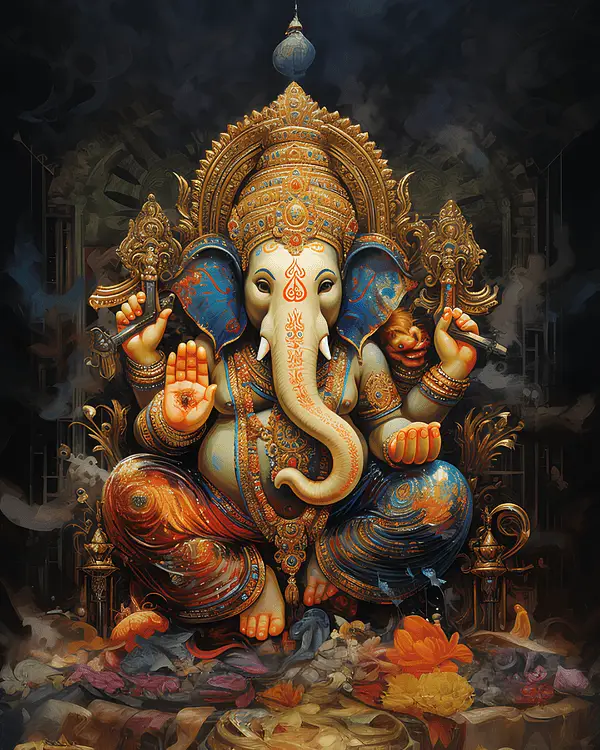Gayatri Mantra

Sanskrit:
ॐ भूर्भुवः स्वः, तत्सवितुर्वरेण्यं
भर्गो देवस्य धीमहि, धियो यो नः प्रचोदयात् ||
English Transliteration:
Om Bhur Bhuvaḥ Swaḥ, Tat Savitur Vareṇyaṁ
Bhargo Devasya Dhīmahi, Dhiyo Yo Naḥ Prachodayāt
English Translation:
“We meditate on the divine light of the Sun, which illuminates all realms — physical, mental, and spiritual. May that divine light inspire our intellect.”
Detailed Explanation in English:
- Om (ॐ): This sacred sound is often considered the essence of the universe. It’s a way of connecting with the divine presence that permeates everything. When you chant “Om,” it’s like tuning into the fundamental vibration of existence.
- Bhur Bhuvaḥ Swaḥ (भूर्भुवः स्वः): These three words represent different realms or planes of existence:
- Bhur (भूर): The physical world, or the Earth, where we live and interact with the material aspects of life.
- Bhuvaḥ (भुवः): The realm of the mind and thoughts, representing our mental and emotional experiences.
- Swaḥ (स्वः): The spiritual realm, which is the domain of the soul and higher consciousness.
- Tat Savitur Vareṇyaṁ (तत्सवितुर्वरेण्यं): Here, we’re calling upon the divine light of the Sun, symbolized as “Savitur,” which is the source of all life and energy. “Vareṇyaṁ” means “worthy of worship,” acknowledging that this divine light is something we hold in the highest regard.
- Bhargo Devasya Dhīmahi (भर्गो देवस्य धीमहि): This line is about meditating on the pure, radiant light of the divine. “Bhargo” is that divine radiance, and “Dhīmahi” is the act of focusing our minds on it. By meditating on this light, we seek to absorb its wisdom and clarity.
- Dhiyo Yo Naḥ Prachodayāt (धियो यो नः प्रचोदयात्): Finally, we ask this divine light to guide and inspire our intellects. “Dhiyo” refers to our minds and intellects, and “Prachodayāt” is the request for inspiration and direction. We’re essentially praying that this divine wisdom will lead us on the right path in life.
हिंदी में विस्तृत व्याख्या:
- ॐ (Om): ॐ एक पवित्र ध्वनि है जिसे पूरे ब्रह्मांड की सार कहा जाता है। इसे उच्चारण करने से ऐसा लगता है जैसे हम उस दिव्य ऊर्जा से जुड़ रहे हैं जो सब कुछ में व्याप्त है। ॐ का जाप करने से हम अस्तित्व की मूलभूत तरंग से जुड़ जाते हैं।
- भूर्भुवः स्वः (Bhur Bhuvaḥ Swaḥ): ये तीन शब्द तीन अलग-अलग लोकों या अस्तित्व के स्तरों को दर्शाते हैं:
- भूर (Bhur): भौतिक जगत, या पृथ्वी, जहां हम रहते हैं और भौतिक जीवन के पहलुओं के साथ बातचीत करते हैं।
- भुवः (Bhuvaḥ): मन और विचारों का क्षेत्र, जो हमारे मानसिक और भावनात्मक अनुभवों का प्रतिनिधित्व करता है।
- स्वः (Swaḥ): आध्यात्मिक क्षेत्र, जो आत्मा और उच्च चेतना का क्षेत्र है।
- तत्सवितुर्वरेण्यं (Tat Savitur Vareṇyaṁ): यहाँ, हम सूर्य के दिव्य प्रकाश का आह्वान कर रहे हैं, जो “सवितुर” के रूप में प्रतीक है, जो सभी जीवन और ऊर्जा का स्रोत है। “वरेण्यं” का अर्थ है “पूजा के योग्य,” और यह बताता है कि हम इस दिव्य प्रकाश को सबसे ऊँचे दर्जे में रखते हैं।
- भर्गो देवस्य धीमहि (Bhargo Devasya Dhīmahi): यह पंक्ति उस शुद्ध, दिव्य प्रकाश पर ध्यान केंद्रित करने के बारे में है। “भर्गो” उस दिव्य प्रकाश को संदर्भित करता है, और “धीमहि” का अर्थ है हमारे मन को उस पर केंद्रित करना। इस प्रकाश पर ध्यान करते हुए, हम उसकी ज्ञान और स्पष्टता को आत्मसात करने का प्रयास करते हैं।
- धियो यो नः प्रचोदयात् (Dhiyo Yo Naḥ Prachodayāt): अंत में, हम इस दिव्य प्रकाश से हमारी बुद्धि को प्रेरित और मार्गदर्शन करने की प्रार्थना करते हैं। “धियो” हमारे मन और बुद्धि को संदर्भित करता है, और “प्रचोदयात्” प्रेरणा और दिशा के लिए अनुरोध है। हम मूल रूप से प्रार्थना कर रहे हैं कि यह दिव्य ज्ञान हमें जीवन के सही रास्ते पर ले जाए।

Gayatri Mantra
Gayatri Mantra Sanskrit:ॐ भूर्भुवः स्वः, तत्सवितुर्वरेण्यंभर्गो देवस्य धीमहि, धियो यो नः प्रचोदयात् ||English Transliteration:Om Bhur Bhuvaḥ Swaḥ, Tat Savitur VareṇyaṁBhargo Devasya Dhīmahi, Dhiyo Yo Naḥ PrachodayātEnglish Translation:"We meditate on the

Hanuman Chalisa
हनुमान चालीसा श्री गुरु चरन सरोज रज निज मनु मुकुरु सुधारि।बरनउँ रघुबर बिमल जसु जो दायकु फल चारि॥बुद्धिहीन तनु जानिके सुमिरौं पवन-कुमार।बल बुद्धि विद्या देहु मोहिं हरहु कलेस विकार॥जय हनुमान

Ganesh Stuti
Ganesh Stuti Ganesha Pancharatnam मूषकवाहन मोदक हस्त, चामर कर्ण विलंबित सूत्र ।वामन रूप महेश्वर पुत्र, विघ्न विनायक पाद नमस्ते ॥१॥ Mūṣakavāhana modaka hasta, Cāmara karṇa vilambita sūtra;Vāmana rūpa maheśvara putra,
